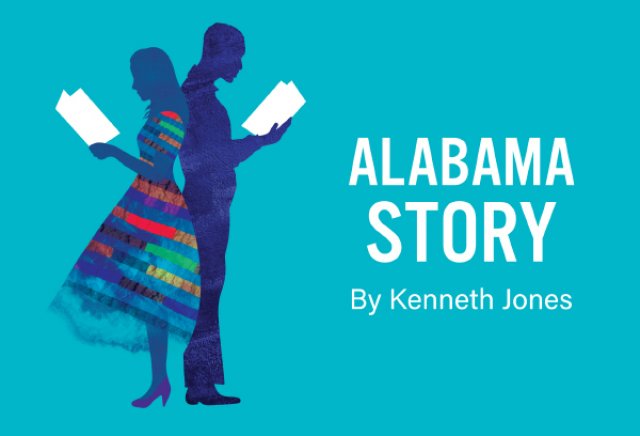Alabama Story by Kenneth Jones
Now ar Ivoryton Playhouse
By: Karen Isaacs - Oct 15, 2024
Because the play is set in 1959 Alabama, it may be too easy for audiences to think that this doesn’t happen here in Connecticut OR that it doesn’t happen now. Luckily, a display at the back of the theater points out that this does happen in Connecticut, and it does happen now; in fact, it is increasing. It is the banning of books from libraries and schools.
The play is based on the events surrounding the head of the Alabama State Library, Miss Emily Reed, and a children’s picture book, The Rabbits’ Wedding, by noted children’s author and illustrator Garth Williams. It might seem innocuous enough, but the illustrations show a white female bunny marrying a black male bunny. For those in the South, the idea of a “mixed race” marriage was horrifying and viewed as indoctrinating young children to accept integration.
After a local White Citizens Council newspaper publishes an article about the book, State Senator E. W. Higgins takes up the cudgel. He had long supported increased funding for the state library, which provides assistance and resources to libraries throughout the state. Yet, he quickly makes it a battle between himself and Miss Reed. He questions the fact that she isn’t married and that she isn’t a native Alabamian. It is ironic that Higgins represents Demopolis, which in Greek means “City of the People.”
Playwright Kenneth Jones uses statements from the people who were involved in some of the dialogue. Jones includes Williams, the author, a character in the play – not only as a sometime-narrator but also playing multiple supporting characters. As portrayed by Daryll Heysham, Williams is folksy and authentic. Of the multiple characters he played, his role as a state representative and a longtime mentor to Higgins was outstanding.
I had to question if the author’s subplot was necessary. He sets up a story about a black man (Joshua) who happens to meet Lily, a white woman he had grown up near, while both are in Montgomery. As they run into each other over a period of months, we see Lily slowly begin to question her memories of their lives when she lived in “the big house,” and his mother worked for them and lived with him in what he recalls was a “shack.” While Anthony Vaughn Merchant and Allie Seibold are excellent in the roles, their story is predictable (she begins to realize the truth about her childhood and society) and implausible. It may make us feel good that they can pick up a friendship shattered when they were 12, but it slows down the show.
Jacqueline Hubbard, Ivoryton’s artistic director, rarely takes the stage though she is a trained actress. Here, she truly captures Emily Reed, giving a nuanced performance. At times, you can see how Reed is trying to restrain her reactions and maintain a calmness she certainly cannot feel. Since Jones researched the character extensively – this battle made her well known within the library world – we can’t fault Hubbard that Reed seems so slow to realize the seriousness of the situation and the emotions the book stirs up. After all, she had worked in Louisiana before Alabama. (In reality, throughout the South, the book was attacked. Williams, who had illustrated volumes of The Little House on the Prairie, Stuart Little, and Charlotte’s Web, saw his career suffer due to the controversy.)
Michael Irvin Pollard is fine as Senator E. W. Higgins (this name is not the name of the actual senator who led the charge against the book.) As he asks questions, that may seem innocent, you see his delight that Reed is oblivious to his motives.
Nicholas-Tyler Corbin plays Thomas Franklin, Reed’s assistant, who tries to warn her. His response in the scene where Reed implies that he leaked information about the book to the newspaper, which stirred up the controversy, is compelling. It generated both gasps and applause as he explained himself.
National Book Ban Week has just concluded. While we might assume that attempts to ban books in schools and libraries happen “elsewhere,” we would be mistaken. According to some recent statistics, there were over 100 attempts to ban books in Connecticut last year. Classics and more recently published books are challenged – from To Kill a Mockingbird, The Adventures of Huckleberry Finn, and Anne Frank’s Diary to children’s picture books and books that tell stories about immigrants and those whose religion, sexuality, or lifestyles vary from the more common.
My major concern was that the first act seemed to drag – this was the result of the overly slow development of the story by the playwright and the pacing by director Todd L. Underwood. The pacing needed to be picked up. Perhaps during the run, this will happen.
All aspects of the production were excellent – from the scenic design by Glenn Bassett, lighting and sound design by Alan Piotrowicz, projections by Jessica Drayton and particularly the costumes by K Duffner. They were absolutely correct for the late ‘50s.
While no dialect coach was listed, the accents sounded to my Connecticut ears, if not totally accurate, representative. Since Heysham, who played Williams, has taught dialects/accents, I wonder if he deserves some credit.
At the end of the play – we learn what happened to many of the characters.
About the controversy, Williams stated, “I was completely unaware that animals with white fur, such as white polar bears and white dogs and white rabbits, were considered blood relations of white beings. I was only aware that a white horse next to a black horse looks very picturesque.” Williams said his story was not written for adults, who “will not understand it, because it is only about a soft furry love and has no hidden message of hate”
Visit IvorytonPlayhouse.org for tickets.
This content courtesy of Shore Publications and Zip06.com

